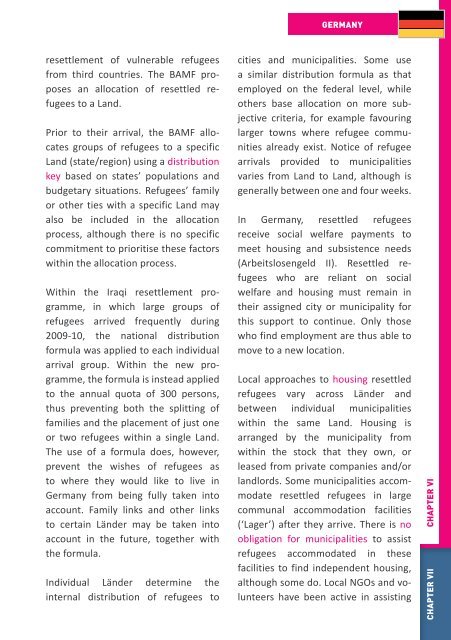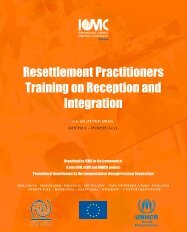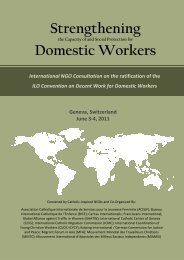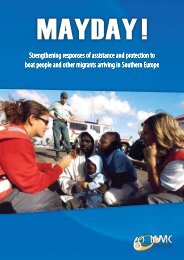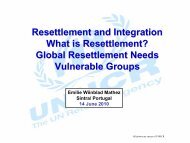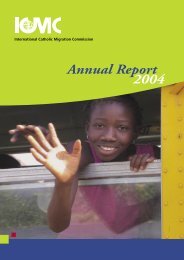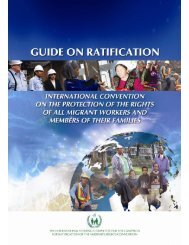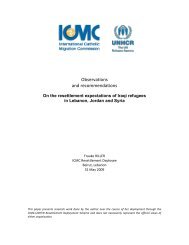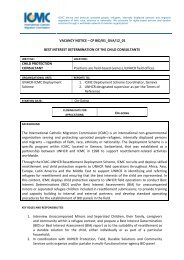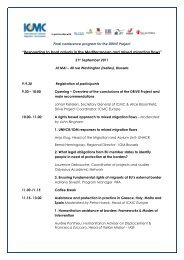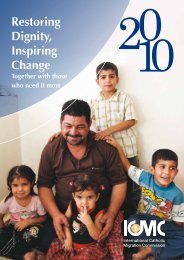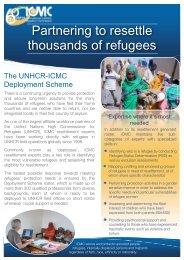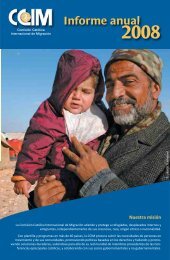ICMCEUROPE WelcometoEurope.pdf (5.89 MB)
ICMCEUROPE WelcometoEurope.pdf (5.89 MB)
ICMCEUROPE WelcometoEurope.pdf (5.89 MB)
Create successful ePaper yourself
Turn your PDF publications into a flip-book with our unique Google optimized e-Paper software.
Germany<br />
185<br />
resettlement of vulnerable refugees<br />
from third countries. The BAMF proposes<br />
an allocation of resettled refugees<br />
to a Land.<br />
Prior to their arrival, the BAMF allocates<br />
groups of refugees to a specific<br />
Land (state/region) using a distribution<br />
key based on states’ populations and<br />
budgetary situations. Refugees’ family<br />
or other ties with a specific Land may<br />
also be included in the allocation<br />
process, although there is no specific<br />
commitment to prioritise these factors<br />
within the allocation process.<br />
Within the Iraqi resettlement programme,<br />
in which large groups of<br />
refugees arrived frequently during<br />
2009-10, the national distribution<br />
formula was applied to each individual<br />
arrival group. Within the new programme,<br />
the formula is instead applied<br />
to the annual quota of 300 persons,<br />
thus preventing both the splitting of<br />
families and the placement of just one<br />
or two refugees within a single Land.<br />
The use of a formula does, however,<br />
prevent the wishes of refugees as<br />
to where they would like to live in<br />
Germany from being fully taken into<br />
account. Family links and other links<br />
to certain Länder may be taken into<br />
account in the future, together with<br />
the formula.<br />
Individual Länder determine the<br />
internal distribution of refugees to<br />
cities and municipalities. Some use<br />
a similar distribution formula as that<br />
employed on the federal level, while<br />
others base allocation on more subjective<br />
criteria, for example favouring<br />
larger towns where refugee communities<br />
already exist. Notice of refugee<br />
arrivals provided to municipalities<br />
varies from Land to Land, although is<br />
generally between one and four weeks.<br />
In Germany, resettled refugees<br />
receive social welfare payments to<br />
meet housing and subsistence needs<br />
(Arbeitslosengeld II). Resettled refugees<br />
who are reliant on social<br />
welfare and housing must remain in<br />
their assigned city or municipality for<br />
this support to continue. Only those<br />
who find employment are thus able to<br />
move to a new location.<br />
Local approaches to housing resettled<br />
refugees vary across Länder and<br />
between individual municipalities<br />
within the same Land. Housing is<br />
arranged by the municipality from<br />
within the stock that they own, or<br />
leased from private companies and/or<br />
landlords. Some municipalities accommodate<br />
resettled refugees in large<br />
communal accommodation facilities<br />
(‘Lager’) after they arrive. There is no<br />
obligation for municipalities to assist<br />
refugees accommodated in these<br />
facilities to find independent housing,<br />
although some do. Local NGOs and volunteers<br />
have been active in assisting<br />
CHAPTER VI<br />
CHAPTER VII


